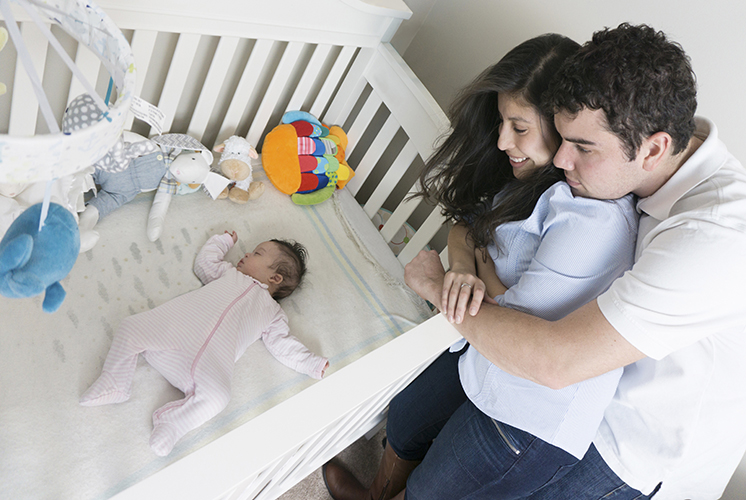
We know that children benefit when their parents are engaged in their learning and development. It is important to talk with parents and learn about the goals they have for their child and family. Learn how to partner with both parents and discover the goals fathers have for their children and themselves. Explore tips, a practice scenario, and featured resources for goal-setting with fathers.
Tips for Goal-setting with Fathers
- Make opportunities to partner with fathers. Recognizing the importance of engaged fathers is a key step in partnering with fathers.
- Create an environment that values the contributions of fathers and other important male figures in children's lives.
- Schedule meetings and home visits when fathers are able to attend.
- Encourage important men in children's lives to visit classrooms and play with their children at home.
- Focus on what fathers are already doing well.
- Learn about the unique goals fathers have for themselves and their children.
- Use a strengths-based approach to learn about fathers' hopes and dreams for themselves, their children, and their family.
- Programs serving pregnant women can include expectant fathers in the family partnership process. This may be the first time that anyone has talked with them about their hopes and dreams for their new child.
- Listen and show genuine interest in what each person has to say.
- Use active listening strategies. While mothers and fathers may have different goals, they share a desired outcome—what is best for their children.
- Focus on what fathers and mothers do well to support parental competence.
Practice Scenario
Explore the following scenario and reflect on opportunities to partner with fathers and other important men in children's lives.
Example: Pat and Ivan began dating when they were both 15. They are now parents to baby Antonia, who just turned 9 months old. Ivan grew up without his father, and he doesn't want this to happen to Antonia.
Before the baby was born, Ivan attended new parent classes with Pat. He now visits Antonia every day in the Early Head Start center at their high school. Both Pat and Ivan still live at home and attend school full time. During a recent visit with Dee, their home visitor, Ivan makes an announcement.
Ivan: I decided to drop out of school to work full time. I want to be a good father and provide for Antonia financially.
Pat: You are a good father. You are always there for Antonia and for me. You take care of us.
Dee: I understand what Pat is saying. Even before Antonia was born, you attended parenting classes. You also take the time to visit Antonia at the center, and you attend school full-time.
Ivan: I know. But good fathers have to provide for their families. If I work full time, I can do more.
Pat: I don't think Ivan should drop out, Dee. We've talked about our plan to enroll at the community college after graduation. I don't want us to have to give up that dream because of Antonia. Plus, I think Antonia would be prouder of us if we finished school and went to college.
Dee: Ivan, I heard you say how important it is for you to provide for Antonia. And I also remember how excited you were when you set your goals to graduate and go to college. Pat, I can hear how passionate you are about wanting both of you to achieve your educational goals.
Ivan: You're right. I was excited about graduating and going to college. I still am. But that feels harder to do now that Antonia is here. I feel like my family needs me to be the provider more than a high school or college graduate.
Dee: Pat, what do you think?
Pat: I really want him to graduate and go to college. I want to go to college, too. I feel like we can do both. I want him to believe we can do both. We just need help figuring it out.
Dee: I would be happy to help in whatever way I can. What do you think about taking some time right now to talk through how you might be able to finish school, enroll in the community college, and support your family?
Ivan: That would be great.
Pat: Yes.
Dee: We know what your goals are. So, let's explore the steps you need to take to achieve them and write them down.
Ivan, Pat, and Dee create an action plan that includes Ivan enrolling in a general equivalency development (GED) program that fits into his goal of working full time. This way he can make progress toward his goal of attending the community college. Other action steps in the plan include Pat continuing to go to school, graduating with her class, and then enrolling in the community college part time.
When Dee follows up with them at the next visit, Ivan proudly shares that he has enrolled in a GED program and is looking for a full-time job.
Reflection
- What did Dee say that showed she was using a strengths-based approach?
- How did Dee value the contribution of both parents?
- How have you communicated with both fathers and mothers about their hopes and dreams?
- Do you have other ideas about ways to honor the voice of both fathers and mothers?
Learn more about goal-setting with fathers in your program:
- The Family Partnership Process: Engaging and Goal-Setting with Families
- Building Partnerships with Families Series
Last Updated: December 3, 2019